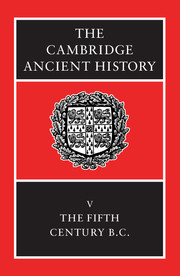Book contents
- Frontmatter
- Contents
- List of maps
- List of text-figures
- Preface
- 1 Sources, chronology, method
- 2 Greece after the Persian Wars
- 3 The Delian League to 449 b. c.
- 4 The Athenian revolution
- 5 Mainland Greece, 479–451 b. c.
- 6 The Thirty Years' Peace
- 7 Sicily, 478-431 b.c.
- 8 Greek culture, religion and society in the fifth century b.c.
- 8a Art: Archaic to Classical
- 8b Classical Cities and Sanctuaries
- 8c Rebuilding in Athens and Attica
- 8d Panhellenic Cults and Panhellenic Poets
- 8e Athenian Cults and Festivals
- 8f Athenian Religion and Literature
- 8g Society and Economy
- 8h Athens as a Cultural Centre
- 9 The Archidamian War
- 10 The Peace of Nicias and the Sicilian Expedition
- 11 The Spartan Resurgence
- Chronological Notes
- Chronological Table
- BIBLIOGRAPHY
- Index
- 1 Greece and Western Asia Minor
- References
8g - Society and Economy
from 8 - Greek culture, religion and society in the fifth century b.c.
Published online by Cambridge University Press: 28 March 2008
- Frontmatter
- Contents
- List of maps
- List of text-figures
- Preface
- 1 Sources, chronology, method
- 2 Greece after the Persian Wars
- 3 The Delian League to 449 b. c.
- 4 The Athenian revolution
- 5 Mainland Greece, 479–451 b. c.
- 6 The Thirty Years' Peace
- 7 Sicily, 478-431 b.c.
- 8 Greek culture, religion and society in the fifth century b.c.
- 8a Art: Archaic to Classical
- 8b Classical Cities and Sanctuaries
- 8c Rebuilding in Athens and Attica
- 8d Panhellenic Cults and Panhellenic Poets
- 8e Athenian Cults and Festivals
- 8f Athenian Religion and Literature
- 8g Society and Economy
- 8h Athens as a Cultural Centre
- 9 The Archidamian War
- 10 The Peace of Nicias and the Sicilian Expedition
- 11 The Spartan Resurgence
- Chronological Notes
- Chronological Table
- BIBLIOGRAPHY
- Index
- 1 Greece and Western Asia Minor
- References
Summary
The only “statement which can be made with security about Athenian society and economy in the Periclean period is that they were evolving rapidly but unsystematically. Since very much the same can be said of our scholarly understanding of those processes, the reader should be warned that this section must needs be more provisional than most, and is likely to date rapidly even so.
It may be helpful to explain why. Earlier generations of scholarship on the subject were (in broad terms) split between two approaches. Some adopted an antiquarian approach, organized according to the sector of economic activity or to the legal status and socio-economic functions of population groups. This approach served essentially as a backdrop to the political, military, artistic and intellectual history of Athens and the rest of Greece. Others, more interpretatively inclined, became enmeshed in the unending debate between those who saw the Greek (including the Athenian) economy as essentially agrarian and undeveloped, based upon the largely autarkic farm plus family (oikos), and those who consciously or subconsciously saw the city states in Hanseatic terms, with a corresponding emphasis on capital, innovation, and market-oriented production and competition. The post-war debate, having belatedly absorbed Hasebroek's fundamental attack of 1928 (a 60) on the latter view, came to be dominated by the late Sir Moses Finley. For present purposes the salient features of his approach were three. The first was methodological, comprising the claim that economic or social institutions and practices cannot be seen in isolation but must be interpreted as integral parts of the general fabric of a society and its value-systems.
- Type
- Chapter
- Information
- The Cambridge Ancient History , pp. 287 - 305Publisher: Cambridge University PressPrint publication year: 1992
References
- 5
- Cited by



